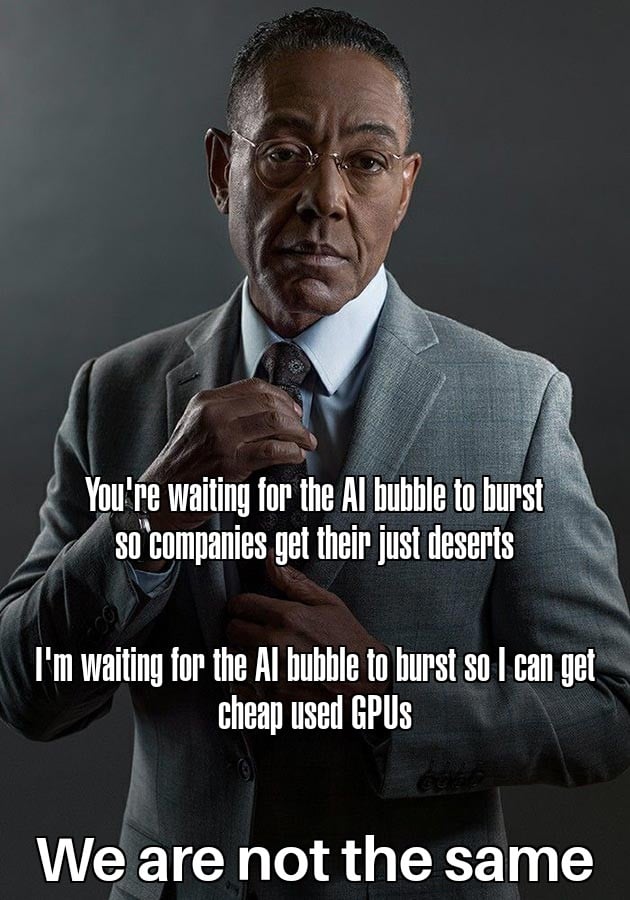this post was submitted on 06 Jan 2025
754 points (97.6% liked)
memes
14030 readers
2163 users here now
Community rules
1. Be civil
No trolling, bigotry or other insulting / annoying behaviour
2. No politics
This is non-politics community. For political memes please go to [email protected]
3. No recent reposts
Check for reposts when posting a meme, you can only repost after 1 month
4. No bots
No bots without the express approval of the mods or the admins
5. No Spam/Ads
No advertisements or spam. This is an instance rule and the only way to live.
A collection of some classic Lemmy memes for your enjoyment
Sister communities
- [email protected] : Star Trek memes, chat and shitposts
- [email protected] : Lemmy Shitposts, anything and everything goes.
- [email protected] : Linux themed memes
- [email protected] : for those who love comic stories.
founded 2 years ago
MODERATORS
you are viewing a single comment's thread
view the rest of the comments
view the rest of the comments

I believe it is likely that there will be a burst at some point, just as with the dot-com burst.
But I think many people wrongly think that it will be the end of or a major setback for AI.
I see no reason why in twenty years AI won't be as prevalent as "dot-com's" are now.
I agree, history always repeats itself. But perhaps the timing is different, it could be 20 years, 10 years, or 50 years who knows
Some current directions in AI, such as LLMs, seem to be dead-ends in the sense that those approaches cannot be incrementally improved much further to, for example, eliminate hallucinations or simply be capable of using logic along with those probability engines in such a way as to, at minimum, exclude the logically impossible from the results.
The dot-com stuff on the other hand was the very first bubble from the very first wave into a whole new technological direction that had just been unlocked and gave access to an entire technological branch of new ways of doing things - it the result of the very first wave of investment around the technology domain of worldwide digital communications and all the other tech branches that became possible due to it.
Basically the Internet was like openning a door to a various new areas of Tech (curiously that wasn't even all that amazingly complex as Tech goes, kinda like a basic wheel isn't exactly complicated but look at all that became possible with its invention), whilst the current AI wave (which is mainly the latest wave of work in the branch of Neural Networks, which is over 3 decades old) is more like a handful of massivelly complicated solutions which are the product of decades of work in a specific direction, some of which work in such a way that they can't be significantly further improved and hence can't be made to get past certain problems it has (the most obvious example being LLM hallucinations).
So whilst I do think that in 20 years there will be some prevalence of AI tech companies in some domains were the AI solutions of this wave of development on it do work well enough (say, entity detection on images), I don't think that will be anywhere comparable to what happened in the 20 years following the start of a new Tech Age which triggered by the Internet.
Mind you, 2 decades is a lot of time in Tech terms, so maybe somebody will come up with a whole different approach to AI in the meanwhile that breaks through the inherent limitations of the current one, just don't count on it.
Edit: just wanted to add that I was there when Darpanet morphed into the Internet and the dot-net bubble that came out of it. At the time everybody and their dog was playing around with making a websites, people were trying new stuff on top of those websites, inventing new comms protocols, wiriting programs that talked to other programs over the network, creating entirely new business models anchored on making a website a storefront - the Internet was Freedom. This AI wave doesn't feel at all like that - sure plenty of people are deploying models created by others and trying them out, but very few are creating new models and a lot of that Tech comes pre-monetised and locked down by large companies who are trying to get money out of anything people do with it - the whole things is not at all like the "we've open this whole new domain, you guys figure out what to do with it" that was the birth of the Internet.